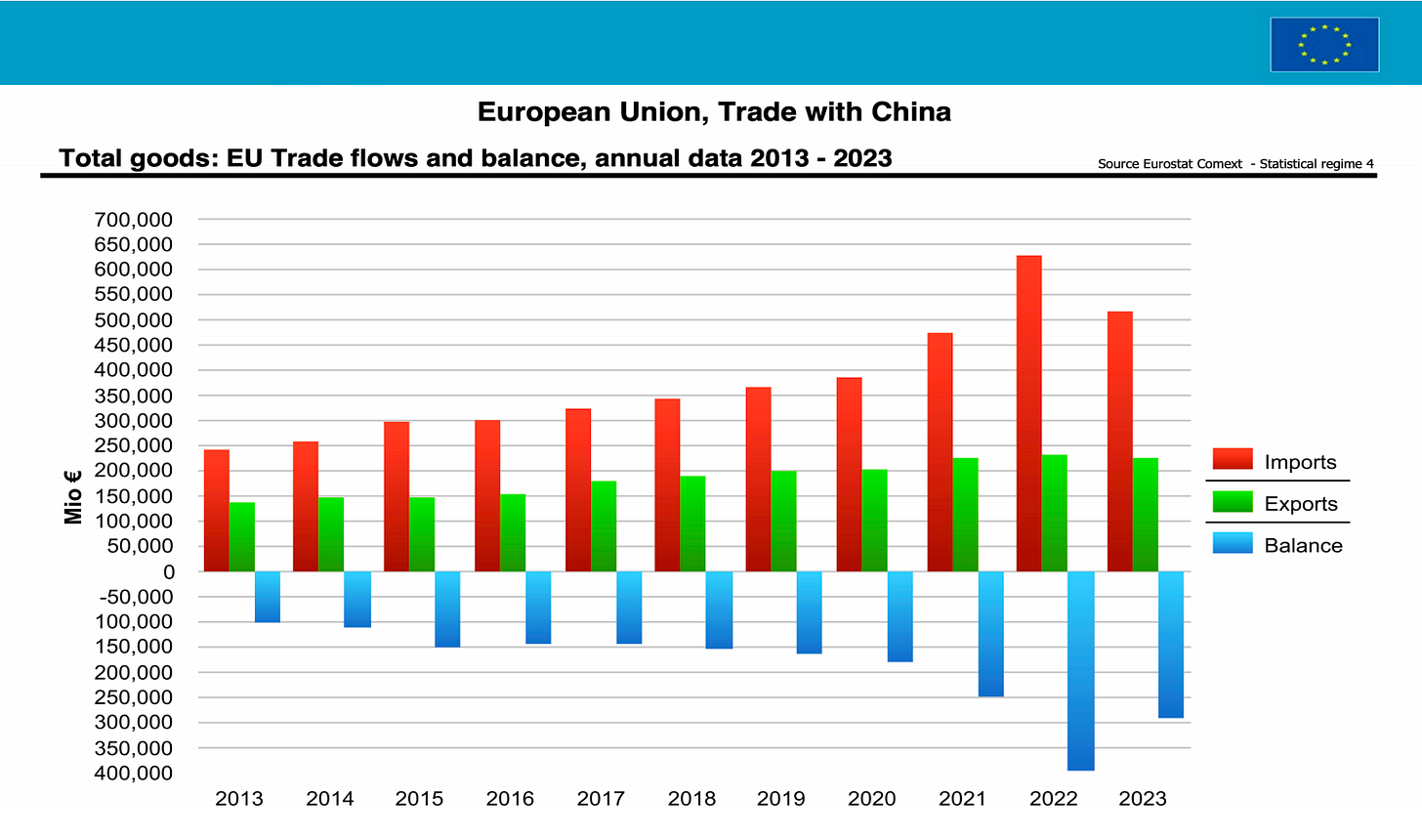Gerhard Stahl on the future of EU-China economic cooperation
Former EU official expects ample room for improved EU-China economic and political cooperation but urges for new trade instruments and warns of security risks from the Russia-China partnership.
Gerhard Stahl is a visiting professor at Peking University HSBC Business School and the College of Europe. He has also served extensively as an EU official, including his last position as Secretary-General of the Committee of the Regions of the European Union from 2004 to 2014.
Professor Stahl has graciously shared his speech draft, "Europe-China Economic and Trade Cooperation," with The East is Read. This speech was presented at the World Dialogue on China Studies, organized by the Shanghai Academy of Social Sciences (SASS) and the European Institute for Asian Studies (EIAS) in Brussels, Belgium, on June 19-20.
Thank you very much for the invitation to participate in this important and timely conference and the possibility to speak about the economic cooperation between China and Europe. We need a world dialog about economic cooperation in an interlinked and global economy, that is threatened by increased geopolitical conflicts and a planetarian climate crisis.
The economic exchanges between China and Europe have been the pillar of the global economy. The EU is China’s most important trading partner after the ASEAN countries and well before the United States. China is after the US the second biggest trading partner of the EU.
China with its opening up and the European Union with successive enlargements and the creation of the European single market were driving forces for the creation of a globalised economy. This globalisation process brought big benefits for developed and developing economies. Bigger choices of affordable goods for consumers, new investment opportunities, people’s exchanges and the lifting of 800 million out of poverty. The World Bank calculated that three-quarter of this successful reduction of extreme poverty happened in China.
The globalisation process of the last four decades changed the world. We have become far more dependent from each other. The world has become a global village where we live closely together, where we are more and more dependent from and affected by each other. Therefore, we must improve our mutual knowledge and understanding, and we must agree on the rules how to live together.
The honeymoon period of globalisation is over. Before commenting on the future of EU-China economic cooperation and showing the necessity and big potential of further economic exchanges I must address the broader political context.
There are winners and losers of globalisation. Old industrial regions suffer under high unemployment and low skilled workers feel neglected. How to share benefits and costs inside countries and between countries is on the top of the political agenda. Furthermore climate change demands that we exit our fossil fuel based economic model leading to an additional big economic transformation. How to keep societies and economies together and achieve sustainable economic development is the big task.
How to reform our international financial and political institutions to represent developing countries and developed economies in an appropriate manner? Are our societies prepared for the necessary changes?
The liberal economic model based on the so-called Washington consensus is no more the sufficient recipe for this new world. It might be an irony of history that the American president Trump declared an end to an international economic order that was very much created by the US after the second world war. The Trump administration did no longer nominate judges for the World Trade Organisation and stopped insofar the trade dispute settlement mechanism. An American First policy started, and US-China rivalry developed. Even if the Biden Administration has changed some decisions of the Trump period, like the withdrawal from the Paris Climate agreement US-China rivalry intensified.
In Europe a further shock has happened. Russia decided to use military force to revise national borders that had been internationally agreed by attacking Ukraine. The EU was a peace project that was created to avoid war amongst its founding members and to improve the economic development of its citizens. Security aspects for Europe were very much left to the NATO with the US providing the bulk of the military means. The EU concentrated on economic development and trade and did not have a geopolitical agenda. In this new word also the EU and European member states must include political consideration in its economic and trade policy. The President of the Commission of the EU Ursula von der Leyen spoke for the first time about a geopolitical Commission.
Something which is normal for China, that economic activities are part of a policy guided development and which is also far more common in the United States with a geopolitical strategy is new for Europe.
What does this mean for the economic cooperation between China and Europe? What does this mean for European and Chinese companies? The EU is still the most open market. It welcomes Chinese investment. Europe sees the mutual benefit of the economic rise of China. Thousands of European companies being active in China since years have contributed to China’s economic success.
For some of the 5000 German companies being present in China, the Chinese market has become more important than the home market. If imported Chinese products are integrated in supply chains of European companies enabling those companies to assemble end-products that are competitive on the world market this is mutually beneficial. If Chinese companies produce in Europe and create jobs here this helps the European economic development.
The EU is an open economy, accepts a multipolar world, supports a rule based multilateral system and rejects protectionism. But the EU has realised that in the new international environment the naïve idea that economic relations are independent from politics is no more possible. The EU realised this not only because of China’s close cooperation between government and business, but also because of the new American industrial policy.
The EU decided that new instruments are needed to assure an equal playing field against its big trading partners. These instruments are e.g. foreign direct investment screening, European Chips act, EU Critical Raw Material act, EU Foreign subsidies regulation. These new instruments will not be a barrier to deepen further economic cooperation with China. To the contrary this enlarged EU toolbox creates the condition to negotiate mutually beneficial economic exchanges and to solve trade conflicts.
I regret that the comprehensive EU-China investment agreement that was negotiated during several years between the EU Commission and the Chinese government and that was approved by Council in 2020 in the last hours of the German EU presidency is blocked by the European Parliament because of political reasons.
Even without the ratification of this agreement there is ample room for improving the economic and political cooperation. The mutual interest in good relations can be seen by the increased visits of European politicians to China and Chinese delegations to Europe. The restarted negotiations between the EU Commission and the Chinese government to solve the subsidy issues for electric cars produced in China is a good signal.
There is one risk for the further successful EU-China economic cooperation. If the Russian Chinese partnership becomes a deliberate support for the Russian military complex and the war efforts, then European public opinion will demand to join the American strategy to confront China, even if this would lead to high economic costs and would be against the interest of European business.










